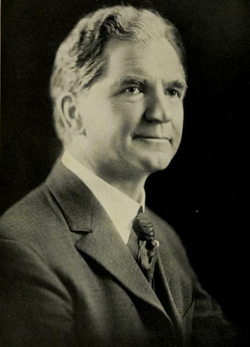Ralph Waldo Trine
Topic: Biography
 From HandWiki - Reading time: 2 min
From HandWiki - Reading time: 2 min
Ralph Waldo Trine | |
|---|---|
 | |
| Born | 9 September 1866[1] Mount Morris, Illinois |
| Died | 22 February 1958 Claremont, California |
| Occupation | Writer |
| Spouse(s) | Grace Steele Hyde Trine |
Ralph Waldo Trine (9 September 1866 – 22 February 1958) was an American New Thought writer, philosopher and animal welfare activist.
Biography
Trine was born in Mount Morris, Illinois to Ellen E. Newcomer and Samuel G. Trine.[1][2] He was educated at Knox College where he graduated A.B. in 1891. He studied history and political science at Johns Hopkins University and obtained his A.M. from Knox College in 1893.[2]
Trine married Grace Steele Hyde and they had one son.[2][3] As a young man he worked as a correspondent for the Boston Evening Transcript. During this time he became influenced by the idealistic philosophy of Ralph Waldo Emerson.[2] Trine was also influenced by George Herron's Christian socialism.[4] Trine's spiritual views have been described as being a mixture of Buddhism, pantheism, spiritualism, transcendentalism, Christian socialism, and neo-Vedanta philosophy.[5]
Trine authored In Tune with the Infinite which has remained the most popular publication in the New Thought movement.[6] It was translated into 20 languages.[2] Unlike most other New Thought writers, Trine did not resort to mental money making advice and has been described as "one of the rare purists whose books were guileless optimism".[7] In the 1920s, Trine became associated with Henry Ford and published some of their conversations in The Power that Wins.[2]
Trine lived and worked on a fruit farm in Croton-on-Hudson, New York.[8][3]
Animal welfare
Trine was a vegetarian for ethical reasons and supported animal welfare.[9] His book Every Living Creature called for kindness to animals and advocated a vegetarian diet.[9][10] He was the director of the American Humane Education Society and the Massachusetts Society for the Prevention of Cruelty to Animals.[1][3]
Selected publications
- In Tune with the Infinite, T. Y. Crowell & Company, 1897
- Every Living Creature, T. Y. Crowell & Company, 1899
- The Greatest Thing Ever Known, T. Y. Crowell & Company, 1898
- In the Fire of the Heart, McClure, Philips & Co, 1906
- My Philosophy and My Religion, Dodd, Mead & Company, 1921
- The Power that Wins, The Bobbs-Merrill Company, 1929
References
- ↑ 1.0 1.1 1.2 Marquis, Albert Nelson (1918). "Who's Who in America: Volume 10, 1918-1919". Chicago: Marquis Who's Who. p. 2742
- ↑ 2.0 2.1 2.2 2.3 2.4 2.5 Melton, J. Gordon (1999). "Religious Leaders of America". The Gale Group. p. 574
- ↑ 3.0 3.1 3.2 Bateman, Newton (1909). "Historical Encyclopedia of Illinois". Chicago: Munsell Publishing Company. p. 1041
- ↑ McKanan, Dan (2010). "The Implicit Religion of Radicalism: Socialist Party Theology, 1900–1934". Journal of the American Academy of Religion 78 (3): 750–789. doi:10.1093/jaarel/lfq050.
- ↑ McMahan, David L (2008). The Making of Buddhist Modernism. Oxford University Press. p. 178. ISBN:978-0-19-518327-6
- ↑ Butler, Jon (2006). "Theory and God in Gotham". History and Theory 45 (4): 47–61. doi:10.1111/j.1468-2303.2006.00383.x.
- ↑ Griswold, Alfred Whitney (1938). "New Thought: A Cult of Success". American Journal of Sociology 40 (3): 309–318. doi:10.1086/216744.
- ↑ Williams, Talcott (1925). "The New International Encyclopædia: Volume 22". New York: Dodd, Mead and Company. p. 475
- ↑ 9.0 9.1 Helstosky, Carol (2014). The Routledge History of Food. Taylor & Francis. p. 186. ISBN:978-0-415-62847-1
- ↑ Iacobbo, Karen; Iacobbo, Michael (2004). Vegetarian America: A History. Praeger. p. 114. ISBN:0-275-97519-3
 |
 KSF
KSF